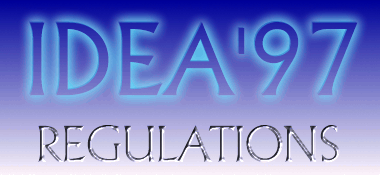|
IDEA-PART B FINAL REGULATIONS*
PARENTALLY-PLACED CHILDREN IN PRIVATE
SCHOOLS
(March 1999)
Major Changes Since NPRM.
Below are major changes to the Part B regulations since the
NPRM regarding children with disabilities enrolled by their parents
in private schools:
- Replacing "IEPs" with "Services Plans."
Because "IEP"
is an explicit term used in the definition of "FAPE" (and because
parentally-placed children with disabilities in religious or other
private schools are not entitled to FAPE in connection with their
private school placements), the NPRM provisions related to IEPs
for these children have been deleted, and have been replaced as
follows:
- SERVICES PLANS.
The term "services plan" has been
adopted for use with parentally placed children in private
schools, in lieu of "IEP." Thus, each private school child with
a disability who has been designated to receive Part B services
"must have a services plan that describes the specific special
education and related services that the LEA will provide to the
child..." (See §300.455(b)(1).)
- SERVICES PLANS MUST MEET SPECIFIED IEP REQUIREMENTS
(i.e., to the extent appropriate, the services plan must --
(A) meet the IEP content requirements of §300.347, and (B) be
developed, reviewed, and revised consistent with the IEP process
requirements of §§300.342-300.346). (See §300.455(b)(2).)
- SEA RESPONSIBILITY FOR SERVICES PLANS.
The final
regulations make clear that the SEA -- in addition to ensuring
IEPs for eligible public school children (see §300.341) -- is
also responsible for ensuring that a services plan is developed
for each private school child with a disability who has been
designated to receive services under Part B. (See
§300.452(b).)
- Child Find for Children in Private Schools --
Comparable to Public Schools.
The final regulations
provide that -- (1) child find activities for private school
children with disabilities must be comparable to those in the
public schools; and (2) public agencies must consult with
appropriate representatives of private school children with
disabilities on how to carry out those activities. (See
§300.451.
- Expenditures (child count; child find;
additional funds).
The "expenditures" requirement in the
final regulations includes the following new provisions:
- CHILD COUNT.
The regulations provide that each
LEA must -- (A) consult with representatives of private school
children with disabilities to decide how to conduct the annual
count of the number of those children, and (B) ensure that the
count is conducted on December 1 or the last Friday of October
of each year. The regulations further provide that the count
data must be used to determine the amount of Part B funds to be
earmarked for these children in the next fiscal year.) (See
§300.453(b).)
- CHILD FIND EXPENDITURES MAY NOT BE CONSIDERED.
Expenditures for child find activities may not be considered
in determining whether the LEA met the expenditures requirement
in §300.453(a). (See §300.453(c)).
- ADDITIONAL SERVICES PERMITTED.
SEAS and LEAS are
not prohibited from providing services to private school
children with disabilities beyond the services required by this
part, consistent with State law or local policy (see
§300.453(d)).
Services Determined.
The final
regulations specify that each LEA must --
- CONSULT WITH REPRESENTATIVES OF PRIVATE SCHOOL
CHILDREN with disabilities on "where" services will be
provided (see §300.454(b)(1));
- CONDUCT MEETINGS to develop, review, and revise a
"services plan," in accordance with §300.455(b), for each
private school child with a disability who has been designated
to receive services under this part (see §300.454(c)(1)); and
- ENSURE THAT A REPRESENTATIVE OF THE PRIVATE SCHOOL
attends, or otherwise participates in, each meeting (see
§300.454(c)(2)).
- Location of services.
The final
regulations make clear that, while transportation might be
provided between a child's home or private school and a service
site (if necessary for the child to benefit from or participate in
the services offered), LEAs are not required to provide
transportation between the child's home and the private school.
(See §300.456(b).)
- Complaints (Due Process Applies Only to
Child Find and Evaluation).
The final regulations specify
that the due process procedures under Part B apply to child find
activities for private school children with disabilities,
including evaluations (but do not apply to the private
school provisions under §§300.452-300.462). (See §300.457.)
* On October 22, 1997, a Notice of Proposed Rulemaking (NPRM) was
published in the Federal Register to amend the
regulations under Part B of the Individuals with Disabilities
Education Act (IDEA). The purposes of the NPRM were to implement
changes made by the IDEA Amendments of 1997, and make other changes
that facilitate the implementation of Part B. The changes made since
the NPRM are based mainly on public comments
received.
2 See §§300.452(b), 300.454(c), and 300.455(b), and the
discussion of §§300.341 and 300.350 in the analysis of comments in
Attachment 1. |


